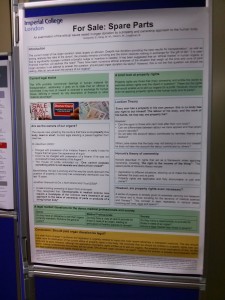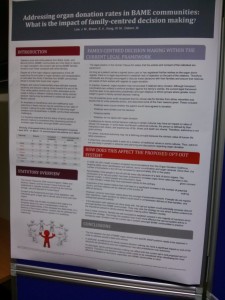Despite writing weeks were then on the move, I guess there was still time attending conferences. Having this in mind, 4 postgraduate medical law LLM students, including me, have attended the Annual Ethics Symposium of the British Transplantation Society which was organised by the Ethics Committee of the British Transplantation Society (BTS Conference) that was held at Hammersmith Hospital in London. The great thing about Kent Law School is that it provided us with adequate financial support, subject to proper submissions of early funding applications. Furthermore, the event related to organ transplantation, a topic that is provided through our Medical law modules such as Issues in Medical Law.
Regarding the event, I have to admit that it was held in a highl stimulus environment with round tables and electronic gadgets in providing the chance of the attending people to statistically vote in relation to provisional findings that were continuously resulting out of the conference. For example, there were questions yes or no of the type ‘Would you consider a transplant from a prisoner donor that is held in a high security prison?’ The distinct feature of the event was the substantially established friendly atmosphere and the quality of the audience that has engaged to fruitful discussions which it may be possible to say that at certain extend, it reflected the opinions of the medical profession, other professions and the general public. What I mean is that it was an interdisciplinary conference in organs transplantation that was approached to every individual.
Moreover, I would like also to share the fact that the host of the event Professor Vasilios Papalois has gone to further efforts in dramatically reducing the entrance fee for students. He wished that he could provide a free entrance for students, but resources limitations did not allow for such provision. However we truly appreciate this reduction as a substantial contributing reason that has incredibly encouraged our position to engage in such fruitful discussion.
The main points of the event considered the media involvement in organ donation and how public awareness can be more effectively engaged in focusing on the positive aspect of organ donation rather than the negative feeling of loss. Furthermore, there was an ethical discussion in the matter of consent from the organ donor and whether a high level of consent is feasible in the organs’ donation environment. Furthermore, main concepts of euthanasia were discussed in relation to a possible smooth combination though organ donation. Finally, the event was closed with the social and ethical challenge of whether prisoners can participate in organ donation procedures and whether social stigma or If I may say social fictions may allow us to do so.
Professor Vasilios Papalois was very friendly and has prepared a welcoming warm environment for all of the participants to the event. He was very willingful to engage even to private discussions after the event where we felt confident that we would like to have the chance to engage to future activities of BTS.
Using simple words, I do really enjoy the opportunities that are provided through my LLM degree because it gives us the further opportunities to engage in external activities that relate to our courses. Our professors encourages us to pursue such activities which I find it significantly beneficiary in order to see the whole picture of our academic aims.
For the sake of coherency I would further enclose the views and comments of my fellow medical law students that have attended the event.
Émilie Larouche Côté – Medical Law & Ethics LLM
The BTS conference was a very good learning opportunity for me. I had never attended a conference related to medicine before, but I certainly hope I will have the chance to participate to many more in the future. What I appreciated the most was the diversity of the backgrounds of the participants. There were lay members of diverse committees on organ transplantation, PR workers for NHS Blood and Transplant, lawyers, organ transplant surgeons, paediatric doctors, a medical ethicist, publicists and even a kidney donor. Although most contributors were from the medical field, this variety of participants allowed for multidisciplinary discussions each of the presentations by the panellists.
However, it surprised me that the questions and comments were quite pragmatic and, to a certain degree, seemed to avoid the greater ethical/moral concerns (especially during the first and the last presentations, which were respectively about the attitude of the medias relating to organ transplantation and live organ donation from prisoners). I suppose this was to be expected, given the large number of medical professionals that were present, after all, they are the ones that have to deal with the organ donors and recipients, as well as their families, on a daily basis. Practical considerations then become very central, and rightfully so I imagine, in the discussion. All in all, the conference provided me with points of views and concerns that are rarely explored within the medical law modules that I have taken this term. Questions such as: what are the impacts of accepting donations from high security prisoners in terms of security costs for the hospital and scheduling appointments? Should those practical impediments warrant a prohibition for this category of people to become live donors?
Although the BTS conference was quite lengthy, time flew by. It was a fascinating day and a fabulous opportunity for me!
Hai-Woong – Medical Law & Ethics LLM
This is my first participation to the symposium in UK and I felt an active and lively atmosphere during the presentations. Everybody in the hall seemed to be enjoying the arguments and the questions followed in a series, so it was wholly interactive discussion through which the arguments were identified and developed. It was obvious that organ transplantation practice is not just the issue in academic area but the practical thing in clinical process that is getting more common around us as one method of the treatments thanks to the medical technology and ethics. I was glad to take an opportunity to have this impressive experience.
Most of all, I appreciate the efforts of my friend, Alex, who told about this symposium to the class and made things easier for us to participate in there. Dr. Pranab, who is working in London and also my friend in medical law class, was the source of information about this event. And I am really grateful that Kent Law School provided us with financial support for the symposium.


